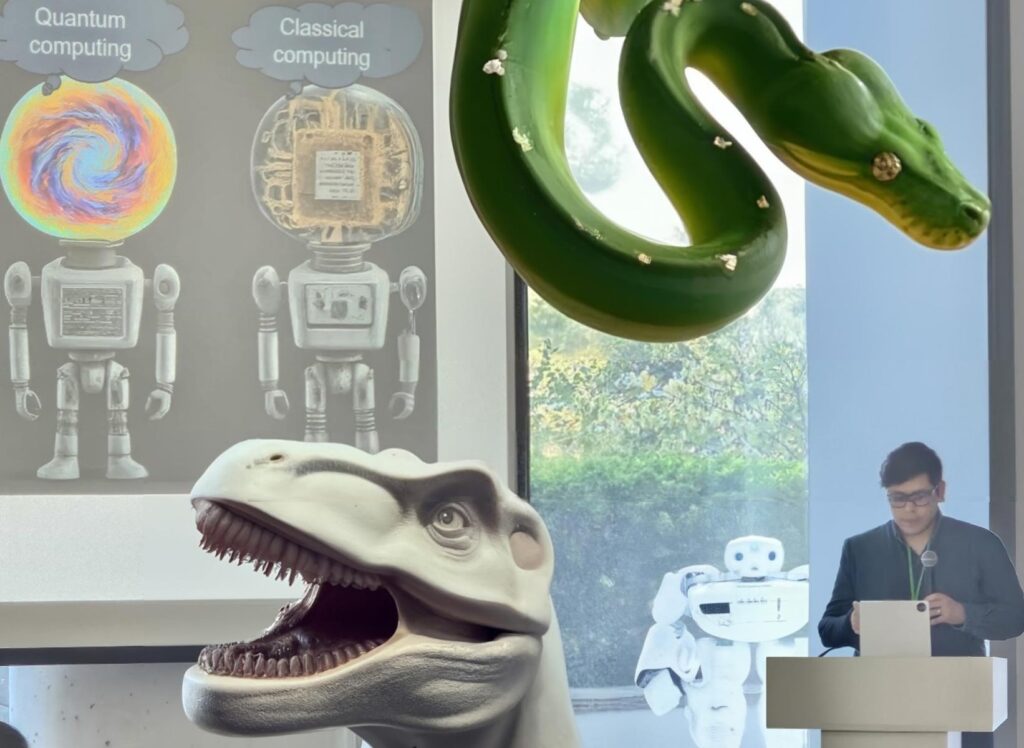Meet Dr. Selim Romero
Dr. Romero Is A Post-Doctoral Research Associate with the Single Cell Data Science Core


Education:
- Doctor of Philosophy (Ph.D.) in Computational Science – The University of Texas at El Paso
- Master of Science (M.S.) in Computational Science – The University of Texas at El Paso
- Master of Science (M.S.) in Physics – The University of Texas at El Paso
- Bachelor of Science (B.S.) in Engineering Physics – Universidad Autónoma de Ciudad Juárez
Biography:
Selim Romero is a dedicated computational scientist with a passion for solving intricate problems in physics, chemistry, biology, and computational science through the development of efficient and precise algorithms. He specializes in algorithm implementation using languages such as C, C++, Python, Fortran, and MATLAB. With extensive experience in parallel computing implementations on CPUs (MPI/OpenMP), Selim optimizes computational performance and possesses a comprehensive understanding of GPUs (CUDA/OpenMP). His research interests encompass quantum materials, quantum computing, and harnessing the principles of the quantum world. Selim is deeply committed to contributing to pioneering research in the fields of physics, chemistry, biology, computational science, and especially quantum computing.
Selim Romero is a dedicated researcher and computational scientist, driven by a passion for advancing our understanding of complex physical, chemical, and biological phenomena through innovative computational methods and high-performance computing. His contributions to the field of computational science and density functional theory have the potential to reshape our approach to solving challenging scientific problems. With a strong educational background and a wealth of technical skills, Selim is poised to make significant contributions to the world of scientific research.
After completion of my master’s degree, I matriculated at the University of Hawai’i at Mānoa to pursue a PhD in Molecular Biosciences and Bioengineering. Soon after, I joined Dr. Matter’s lab at the University of Hawaii Cancer Center as a graduate research assistant where I conducted my PhD research in pregnancy-induced heart disease. My research was presented at the 2022 Annual John A. Burns School of Medicine (JABSOM) Biomedical Sciences & Health Disparities Research Symposium. I also worked on several other research projects during my doctoral studies that resulted in four publications, one in the cardiovascular field and three in the nutrition and microbiome research field.
Research/Experience:
Developed Fortran90 code for density functional theory methods, including Perdew and Zunger self-interaction correction (PZSIC) and locally scaled self-interaction correction (LSIC).
Utilized High Performance Computing (HPC) with Fortran90 MPI code, achieving significant speed improvements compared to traditional methods.
Publications:
“Local self-interaction correction method with a simple scaling factor,” Selim Romero, Yoh Yamamoto, Tunna Baruah, and Rajendra Zope, Phys. Chem. Chem. Phys., 2021.
“A Step in the Direction of Resolving the Paradox of Perdew-Zunger Self-interaction Correction. II. Gauge Consistency of the Energy Density at Three Levels of Approximation,” Puskar Bhattarai, Kamal Wagle, Chandra Shahi, Yoh Yamamoto, Selim Romero, Biswajit Santra, Rajendra R. Zope, Juan E. Peralta, Koblar A. Jackson, and John P. Perdew, J. Chem. Phys. 152, 214109 (2020).
“Improvements in the orbitalwise scaling down of Perdew–Zunger self-interaction correction in many-electron regions,” Yoh Yamamoto, Selim Romero, Tunna Baruah, and Rajendra R. Zope, J. Chem. Phys. 152, 174112 (2020).
“Spin-state gaps and self-interaction-corrected density functional approximations: Octahedral Fe(II) complexes as a case study,” Selim Romero, Tunna Baruah, and Rajendra Zope, J. Chem. Phys. 158, 054305 (2023).
“A GEANT4 Study of a Gamma-ray Collimation Array,” J. A. Lopez, S. S. Romero, O. Hernandez Rodriguez, J. Holmes, and R. Alarcon, Journal of Nuclear Physics, Material Sciences, Radiation and Applications, 7(2), 217-221 (2020).
Workshops and Trainings:
- Qiskit Global Summer School 2023: Theory To Implementation
- NERSC Modern Fortran Basics (FUN training)
- Codee Training Series: Write accelerated GPU code at Expert Level
- N-Ways To GPU Programming Bootcamp and Beyond for NERSC
- Intel Developer Tools Optimization Training (Webinar)
